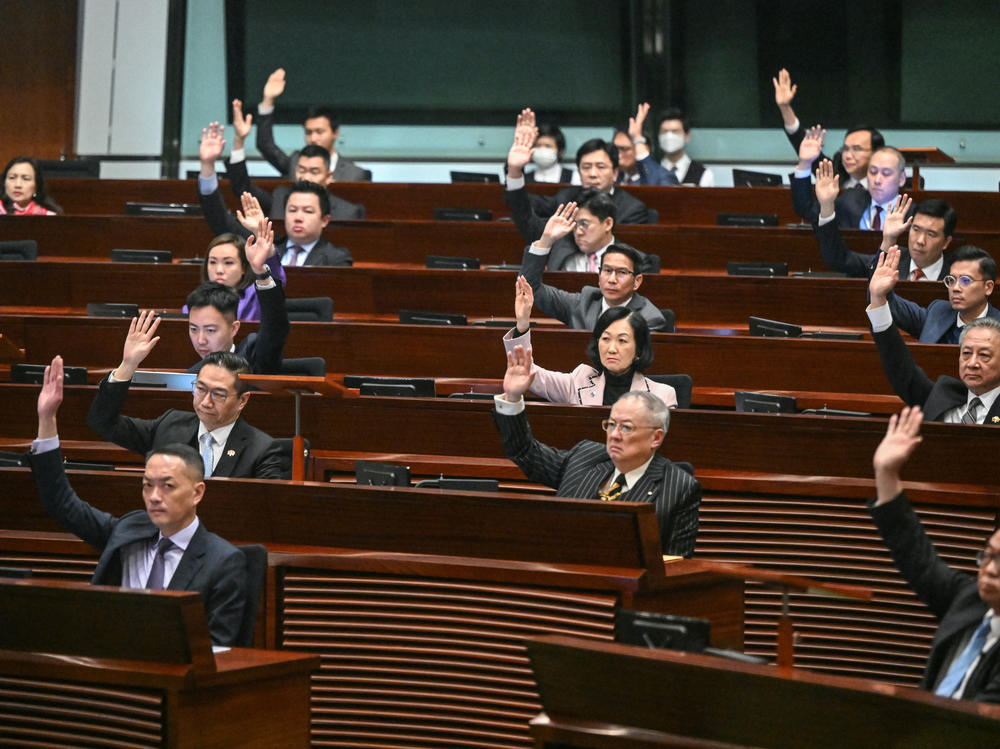Section Branding
Header Content
Hong Kong passes a new security law that toughens punishment of dissent
Primary Content
Hong Kong lawmakers have passed new national security legislation that carries severe punishment for a broad range of offenses, including life imprisonment for acts deemed to be insurrection.
The legislation, called the Safeguarding National Security Bill, will toughen up the already stringent national security law Beijing implemented in 2020 following major pro-democracy protests in Hong Kong.
Hong Kong's lawmakers first tried to pass security legislation in 2003 but shelved it after mass protests against what residents feared was overreach from Beijing.
This time around, Hong Kong lawmakers fast-tracked it for approval within two weeks of reading a full draft.
The bill is linked to Article 23 of Hong Kong's mini-constitution called the Basic Law, which requires the city to enact its own laws "to prohibit any act of treason, secession, sedition, subversion" against the government, as well as bar foreign political organizations from conducting political activities there, among other provisions.
Since China imposed the national security law in 2020, many prominent Hong Kong activists have been jailed or gone into exile.
But Hong Kong's pro-Beijing lawmakers argued that new legislation was needed to fill loopholes left by the sweeping 2020 law.
"Now we would have had the offense of secession and subversion, overthrow of government, which means that if the rioters started waving pro-independence banners, we could have prosecuted them, which means that it would not have been necessary for Beijing to step in and introduce its own national security law," Regina Ip, a Hong Kong politician said on a Hong Kong talk show this year.
Ip was the city's security minister back in 2003 who championed the idea of pushing through Article 23 provisions.
However, the bill passed Tuesday is more aggressive than the version Ip proposed in 2003. It can deny people arrested access to a lawyer at first or to one of their choice. It also creates new types of offenses — updated to reflect new technologies — including the crime of "unauthorized acts related to a computer or electronic systems," which can be punished by up to a life sentence.
International human rights groups say the new legislation is overly broad, with vaguely defined legal concepts like "external interference," threatening to increase punishment for people over various acts deemed as dissent against Hong Kong authorities or the Chinese government in Beijing.
"The new security law will usher Hong Kong into a new era of authoritarianism. Now even possessing a book critical of the Chinese government can violate national security and mean years in prison in Hong Kong," Maya Wang, acting China director at Human Rights Watch, said in a statement Tuesday.
The vagueness of how terms like "national security" and "state secrets" are used in the new bill is alarming to legal experts like Alvin Cheung, an affiliate scholar at the U.S. Asia Law Institute at New York University.
"It's clear that the current bill much more closely tracks the mainland's all-embracing concept of national security," Cheung told NPR.
Thomas Kellogg, executive director of the Center for Asian Law at Georgetown University, told NPR earlier this year that Hong Kong's government has been trying to target organizations of its citizens in exile in the United States, the United Kingdom and elsewhere. "It seems that they want to use this new law to also tackle these overseas activists," he said.

